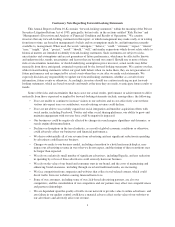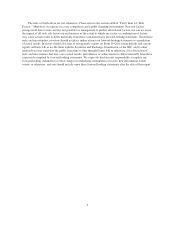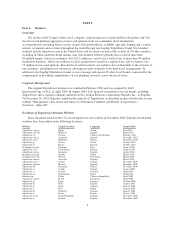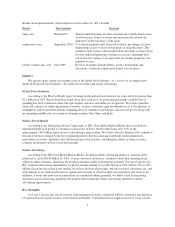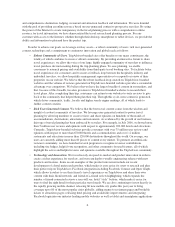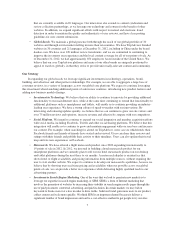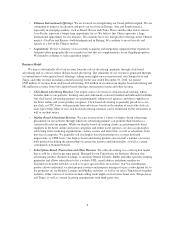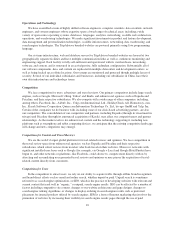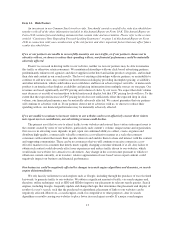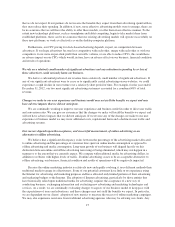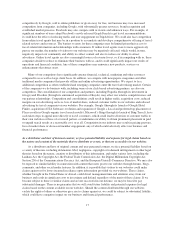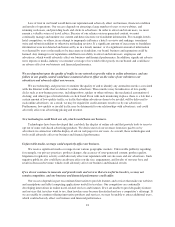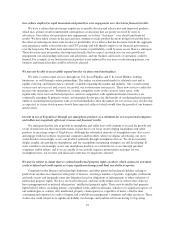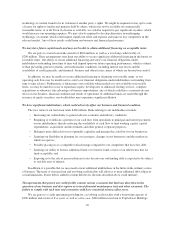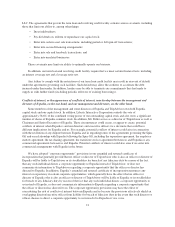TripAdvisor 2012 Annual Report Download - page 21
Download and view the complete annual report
Please find page 21 of the 2012 TripAdvisor annual report below. You can navigate through the pages in the report by either clicking on the pages listed below, or by using the keyword search tool below to find specific information within the annual report.placement, contextual advertising, and paid inclusion. SEM is a competitive marketplace with competitors
continually updating their traffic acquisition strategies and economic models across a large number of keywords
and markets.
Competition for Advertisers
We compete with search engines, such as Google, Bing, and Yahoo!, online media companies and ad
networks, as well as offline advertising sources, such as television and print media, for travel supplier, online
travel agency and other travel-related advertising budgets. These competitors have large client bases and
significantly greater resources than we have and competition from these parties could cause us to lose advertising
customers or shares of advertising expenditures. However, we believe that our large audience of highly-qualified,
highly-engaged users makes TripAdvisor an important strategic buy for online travel agents and hotel partners.
Intellectual Property
Our intellectual property, including patents, trademarks, copyrights, domain names, trade dress, proprietary
technology and trade secrets, is an important component of our business. We rely on our intellectual property
rights in our content, proprietary technology, software code, ratings indexes, databases of reviews and forum
content, images, videos, graphics and brands. We have acquired some of our intellectual property rights through
licenses and content agreements with third parties. These licenses and agreements may place restrictions on our
use of the intellectual property.
We protect our intellectual property by relying on our terms of use, confidentiality procedures and
contractual provisions, as well as on international, national, state and common law rights. In addition, we enter
into confidentiality and invention assignment agreements with employees and contractors, and confidentiality
agreements with other third parties. We protect our brands by pursuing the trademark registration of our core
brands, such as TripAdvisor and the Owl Logo, maintaining our trademark portfolio, securing contractual
trademark rights protection when appropriate, and relying on common law trademark rights when appropriate.
We also register copyrights and domain names as deemed appropriate. Additionally, we protect our trademarks,
domain names and copyrights with an enforcement program and the use of intellectual property licenses.
We have considered, and will continue to consider, the appropriateness of filing for patents to protect future
inventions, as circumstances may warrant. However, many patents protect only specific inventions and there can
be no assurance that others may not create new products or methods that achieve similar results without
infringing upon patents owned by us.
Regulation
We are subject to a number of United States federal and state and foreign laws and regulations that affect
companies conducting business on the Internet, many of which are still evolving and being tested in courts, and
could be interpreted in ways that could harm our business. These may involve user privacy, libel, rights of
publicity, data protection, content, intellectual property, distribution, electronic contracts and other
communications, competition, protection of minors, consumer protection, taxation and online payment services.
In particular, we are subject to United States federal and state and foreign laws regarding privacy and protection
of user data. Foreign data protection, privacy, and other laws and regulations are often more restrictive than those
in the United States. United States federal and state and foreign laws and regulations are constantly evolving and
can be subject to significant change. In addition, the application and interpretation of these laws and regulations
is often uncertain, particularly in the new and rapidly-evolving industry in which we operate. There are also a
number of legislative proposals pending before the United States Congress, various state legislative bodies, and
foreign governments concerning data protection which could affect us. For example, a revision to the 1995
European Union Data Protection Directive is currently being considered by legislative bodies that may include
more stringent operational requirements for data processors and significant penalties for non-compliance.
11


